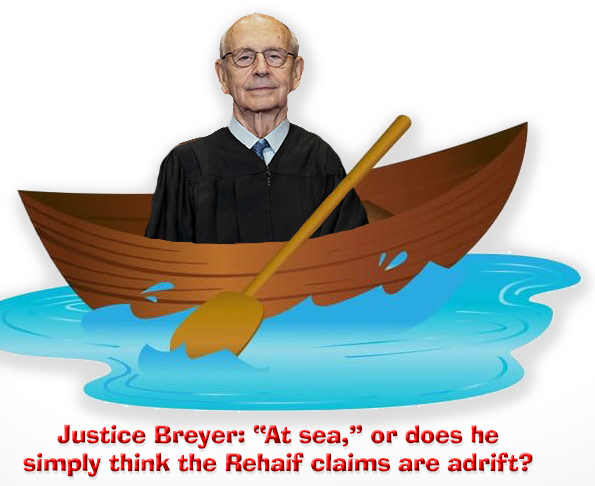We post news and comment on federal criminal justice issues, focused primarily on trial and post-conviction matters, legislative initiatives, and sentencing issues.

YOU’LL NEVER FORGET YOUR FIRST FELONY
 The Supreme Court heard oral arguments last week in United States v. Gary and Greer v. United States, two cases that would dramatically increase the benefits to defendants flowing from Rehaif v. United States.
The Supreme Court heard oral arguments last week in United States v. Gary and Greer v. United States, two cases that would dramatically increase the benefits to defendants flowing from Rehaif v. United States.
But the devil’s in the details, and the prospects for neither one looks good. While it’s dangerous to predict the outcome of a case based on what you hear at oral argument, the Supremes seemed skeptical of the relief the defendants were urging and perhaps just a little uneasy over the genie that Rehaif let out of the bottle.
Mike Gary pled guilty to an 18 USC 922(g)(1) felon-in-possession charge. After Rehaif held that a defendant had to actually know that he or she fell within a class that was prohibited from having a gun, the 4th Circuit held that the district court’s failure to tell Mike that the government had to prove he knew he was a felon at the time he possessed the weapon was a “structural” error, and therefore his conviction had to be vacated whether or not the error made any difference in the proceeding’s outcome.
In the second case, Greg Greer was convicted by a jury of being a felon in possession. After Rehaif, the 11th Circuit reaffirmed his conviction on the ground that, according to his presentence report (which was not part of the evidence at trial), Greg had previously been convicted of five felonies and had served more than a year in prison. Therefore, the court reasoned, it wouldn’t have made any difference if his jury had been properly instructed about the government’s obligations, because if Rehaif had been the law, the government would easily have shown that Greg knew he was a prohibited felon. At the Supreme Court, Greg was arguing that the appellate court should have limited itself to the evidence in front of the jury (which of course contained nothing about Greg’s checkered past).
The justices were overtly skeptical of Greg’s argument. Justice Thomas asked, “Do you have any doubt in this case that the government would have preferred to introduce the evidence that you say is lacking here?… Your approach would put someone who stipulates in a better position than someone who actually went to trial.”
 Justice Breyer, who wrote Rehaif, seemed to be looking for a way to limit any further fallout from the decision. “Why only look at the trial record?” he asked, before posing a number of hypotheticals. “There could have been something that happened before the trial [that is] an error,” the justice noted. “There could be something on the list of witnesses, there could be a limitation on what’s asked,” Breyer continued. “The possibilities are endless. So where does this idea come from you can only look at certain things?” he asked. “I’m totally at sea as to why or how to draw some line.”
Justice Breyer, who wrote Rehaif, seemed to be looking for a way to limit any further fallout from the decision. “Why only look at the trial record?” he asked, before posing a number of hypotheticals. “There could have been something that happened before the trial [that is] an error,” the justice noted. “There could be something on the list of witnesses, there could be a limitation on what’s asked,” Breyer continued. “The possibilities are endless. So where does this idea come from you can only look at certain things?” he asked. “I’m totally at sea as to why or how to draw some line.”
The justices seemed similarly skeptical of Mike Gary’s case, with many noting that it could have widespread effects on existing convictions. Speaking about the proposition that an individual’s felony status “is not the kind of thing that one forgets,” Justice Kavanaugh said, “from that premise it seems odd to throw out all of the convictions” and asked Mike’s lawyer if he believed that premise to be true.
 “The question shouldn’t be whether defendants are typically aware of the element or the element is typically satisfied,” Gary’s counsel replied. “The question should be whether the defendant when he pleads guilty understood that that was part of the charge and therefore was given an opportunity to exercise his own free will.”
“The question shouldn’t be whether defendants are typically aware of the element or the element is typically satisfied,” Gary’s counsel replied. “The question should be whether the defendant when he pleads guilty understood that that was part of the charge and therefore was given an opportunity to exercise his own free will.”
Both cases will be decided by the end of June.
SCOTUSBlog, Justices wrestle with procedural issues stemming from their own federal criminal-law decision (April 21, 2021)
Law & Crime, SCOTUS Seems to Have Heeded Justice Alito’s Warning, Appears Unlikely to Reverse Gun Convictions (April 20, 2021)
– Thomas L. Root

